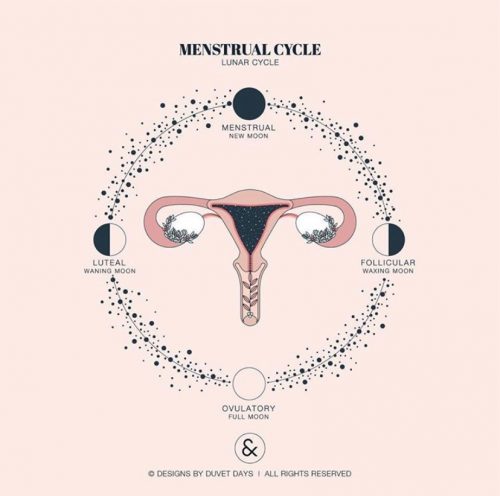How To Cope With Heavy Menstruation
Posted by Christina Pistotnik

I love being a woman and all the joys that come with the territory, however menstruation can be a lesser joy too. This time of the month can cause even more distress among people who experience an excess of menstrual flow.
I know this from personal experience with my mom. When I was young, I witnessed my mom going through this whenever her menstrual cycle arrived. We would always have to be close to a washroom so that she could change her sanitary product in time to prevent it from leaking and ruining her clothes.
Unfortunately, there were times that she wouldn’t be able to make it in time and I remember seeing the embarrassment and struggle on her face. Ruining clothing was only one aspect of her heavy menses, another aspect was extreme fatigue, due to such a high amount of blood loss. It pained me to see her barely able to get up in the mornings or having problems getting through the day efficiently.
So how do you know If you have a heavy menstrual cycle?
Heavy menstruation is when you bleed ≥80 mL or fill ≥16 normal sized sanitary products during a single menstrual period (4-7days). Also, heavy menses are indicated if you have flooding- filling a super sanitary product in less than 2 hours.
Individual bodies bleed differently each month, but it is considered normal menstrual blood loss if you bleed 10-35mL or fill 1-7 normal sized sanitary products in a single menstrual period.
One way to track how much you are bleeding is by using a menstrual cup, which will have measurements marked on it. This would allow you to record the amount of blood loss every time you empty your cup.
What causes heavy menstruation?
The Centre for Menstrual Cycle and Ovulation Research at UBC states that it is still unclear as to why some women experience heavy periods when compared to others. However, they do discuss that excess estrogen and low progesterone could be part of the issue. This is because estrogen can help to build the uterine lining while progesterone can thin it.
People who tend to have heavier menstruation tend to be those with estrogen/progesterone irregularities such as teens, perimenopausal people, and sufferers of fibroids and endometriosis.
Other reasons for heavy menstruation could be related to thyroid or blood clotting issues and in rare cases it could be due to cancer. Therefore it is important to discuss heavy menstruation with a medical doctor in order to get the proper testing and diagnosis.
What can you do to help?
Acupuncture
Since hormonal imbalance can be an issue related to heavy menstruation, acupuncture can have a positive effect by balancing hormones throughout the cycle (2).
In one 2018 study, a 17 year-old with abnormal uterine bleeding (who bled 3 times per month, using 10 heavy sanitary pads per day) had normalized menstrual flow and regularity after receiving 10 acupuncture treatments within 4 weeks. (3)
Supplements
DIM (diindolylmethane) and I3C (indole-3-carbinol) help to metabolize estrogen, decreasing excess estrogen and supporting the relationship between estrogen and progesterone.
Calcium D-glucarate detoxifies excess and toxic estrogens. It also assists in liver metabolism of toxic substances.
Always talk to a health professional before starting any supplementation to confirm what supplements and doses are right for you.
Conventional Western Medical Intervention
Progestin-secreting IUDs decrease menstrual flow because they deliver a small dose of the synthetic progestin directly to the uterine lining. Some of that synthetic hormone does enter the bloodstream, but at one-tenth the dose of most oral contraceptive pills (OCP).
Endometrial ablation is the surgical scraping of the uterine lining. It is effective, but 22 percent of women require a repeat procedure, and 20 percent experience long-term pelvic pain.
A hysterectomy (surgical removal of the uterus) is the highest level of intervention and has been the standard medical treatment for heavy menstruation for many years. It is still necessary for some people, but I encourage my patients to avoid this option, if at all possible.
Medical treatments are sometimes required, despite every effort to address the issue. As in the case of my mom, the only option was for her to have a partial hysterectomy. Please know that it is not a failure to resort to a medical treatment.
No one can be expected to endure very heavy periods for a long period of time. Providing that it isn’t detrimental to your health, it is often a viable and effective option to try natural treatments before exploring surgery or hormone treatments – it’s certainly worth exploring.
The practitioners at Whole Family Health specialize in reproductive health and we would be happy to assist in your menstrual wellbeing. Contact us today to get started!
References
- Ko JH, Kim SN. A Literature Review of Women’s Sex Hormone Changes by Acupuncture Treatment: Analysis of Human and Animal Studies. Evid Based Complement Alternat Med. 2018;2018:3752723. Published 2018 Nov 15. doi:10.1155/2018/3752723
- Penn, YY. Acupuncture treatment for dysfunctional uterine bleeding in an adolescent. BMJ case reports vol. 2018 bcr2018224725. 9 Aug. 2018, doi:10.1136/bcr-2018-224725 https://www.ncbi.nlm.nih.gov/pmc/articles/PMC6088286/
